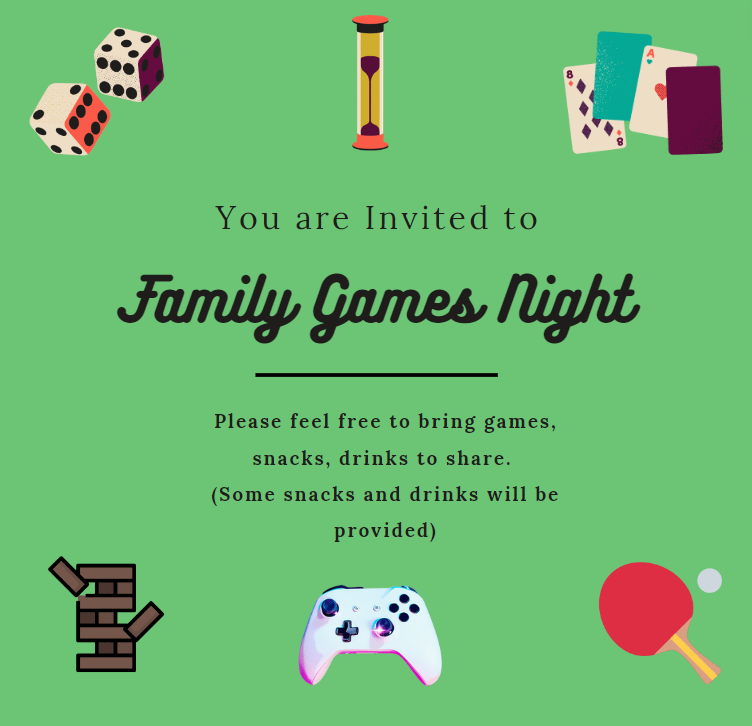In 2023, one of our intentions for the year was to create more friendship and community around us. With that in mind, we decided to host a monthly games night. At that point our kids were a 2nd grader, 8th grader and 10th grader. We had one kid in elementary school, one in middle school, and one in high school. Talk about chaos. Three different schools with three different schedules. Since the kids were all in different schools and age ranges, it was sometimes difficult to be social.
We began in January 2023 and opened the invitation to any of our kids’ friends and their families, or any friends we had that had kids within our kids’ age ranges. The invite was open with the ask to bring a game and/or a snack to share. Potluck style. Here are the top 10 lessons we learned from our social experiment.
People want to have fun. This is kind of a no brainer, but while everyone in our friend circle is incredibly busy, more often than not, they made time to have some fun. Many of our friends became regulars at our monthly games gatherings.
People want to contribute, but they don’t want to be in charge. When we initially began planning monthly games night, we thought, maybe it’ll catch on and others will offer to host. If not, we were all-in to host monthly for a year. At one point someone mentioned hosting in the future, but it never materialized. We happily hosted all the games nights for 2023.
A loose structure is better than an agenda. For the first couple of game nights, we set up tables with specific games on them to suggest games to play. We had a banquet table with kids games, card games at the dining room table, video games set up in the living room and garage, a ping pong table in the garage, and yard games outside (when weather permitted). Eventually, we learned it was better to have games available in a stack, but to let attendees randomly pick games rather than suggest them.
It’s fun to see what people bring. We learned that some friends loved to cook, and they would bring extravagant and tasty concoctions like hand-made artisan flatbreads, desserts, and snacks. Others contributed with drinks or store bought snacks. All contributions were welcomed and appreciated, and somehow, they always worked out, providing plenty for everyone to nosh on.
Weather seemed to dictate game participation. On bad weather days, we had the most attendance and some of the most competitive game play. Since everyone was stuck inside, they hunkered down and played lots of games. During one particularly sunny game day, none of the adults played games at all. Instead, we sat outside in the backyard and just relaxed. Summer games nights were less about games and more about the adults relaxing and chatting while the kids ran around.
Attendance can vary wildly. While most games night averaged at least a dozen guests, our highest attendance night was 40, and our lowest was 6. They were each successful in their own ways. The high attendance day had people playing in almost every room in our house and was ironically a bad weather day. Our lowest attendance day was just two families, and as expected was the most chill, and also the most connected.
The importance of the reminder. Even with a standing invitation (in our case the last Saturday of the month), you still have to remind people. I was in charge of creating the invites (which I did digitally on Canva), and my partner was in charge of extending them and following up via text. He’d send them out about 3 weeks in advance, and then send reminders mid-week (usually Wednesday) of the party week. During the months where we had lowest attendance, it coincided with late reminders. Go figure!
Holidays make for lower attendance. November and December were tough months to get participation because most people already had family and holiday social events to attend (Thanksgiving and Christmas here in the United States). Also, parents of the younger kids were much more likely to attend. Our older kids’ friends would come, but rarely the parents. We weren’t sure if it was because the parents were busy, less engaged, or if the teenagers just forgot to invite their parents (since we did not know the parents as well).
Friends who play together stay together. Cheesy, I know, but we built closer relationships with those families that attended regularly. As you would expect, we began to be better friends with people who chose to attend. Since then, we have attended sporting events together, house/dog/cat sit for each other when someone travels and have had several grown-up only events such as book clubs and moms’ nights.
Hosting is worth it. If you are seeking more social interactions, it is 100% worth hosting. While we didn’t carry the tradition over to 2024 (we couldn’t commit to monthly), we absolutely loved hosting when we did. We plan to re-ignite game nights again in the future, once our family and work schedules normalize. We have no regrets in hosting a year of events.
To summarize, the social experiment of hosting a monthly games night gave us exactly what we were hoping for. We created stronger community connections and friendships and had lots of fun along the way. We are extremely happy that we hosted for a year despite the burden of the planning, prepping, and cleanup that comes along with hosting any event at your home. While we already had a large collection of board and family friendly games, we learned about several others that we have since adopted. It’s always fun to learn a new game or teach someone to play one of your favorites.
If others are interested in trying the same, we suggest doing it sooner than later, when your kids are young, even though that is usually the busiest and hardest time. We just noticed that the older kids’ parents did not take part as often. If you are looking for more community, it is easier to build when they are little. It is also when we probably need it the most! It doesn’t have to cost a lot as long as you request participants to contribute. We generally provided easy snacks and non-alcoholic beverages and let others know to bring their own and bring something to share. Above all, keep it flexible and plan to have fun! We did and it was totally worth it!
Yvonne Lee-Hawkins, IPHM, is a holistic wellness coach, stress strategist, and writer. She has tried and tested countless health and wellness strategies to help her deal with the relentless pressures of her former high achieving corporate career and motherhood. When she is not working, she loves to go on adventures with her family, in the Pacific Northwest where they call home. You can find out more on her website, or follow her on LinkedIn, Medium, or Instagram.

